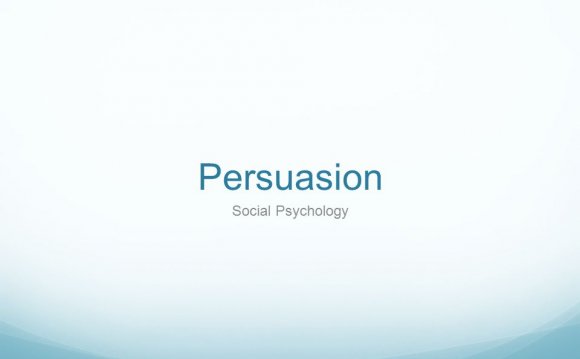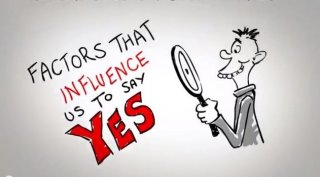
 Unless you’re living in a cave, people are trying to influence you all the time. Sometimes they’re doing it in an annoying or underhanded way. I signed up for a credit card recently, and the bank that issued the card sent me a “thank you gift.” It sounded pretty good, a case of fine wines chosen by connoisseurs, themselves sponsored by the Wall Street Journal! I’m inclined to be grateful, until I read the fine print, it’s really a con designed to get me to sign up for a program in which I’m sent a case of wine every 3 months, and unless I specifically opt out it’ll all be billed to my new credit card. Now instead of gratitude I feel anger, and I’ll be careful not to trust the bank or the Wall Street Journal in the future.
Unless you’re living in a cave, people are trying to influence you all the time. Sometimes they’re doing it in an annoying or underhanded way. I signed up for a credit card recently, and the bank that issued the card sent me a “thank you gift.” It sounded pretty good, a case of fine wines chosen by connoisseurs, themselves sponsored by the Wall Street Journal! I’m inclined to be grateful, until I read the fine print, it’s really a con designed to get me to sign up for a program in which I’m sent a case of wine every 3 months, and unless I specifically opt out it’ll all be billed to my new credit card. Now instead of gratitude I feel anger, and I’ll be careful not to trust the bank or the Wall Street Journal in the future.
And again, with the exception of those of you hermits living in caves, you’re also trying to influence other people all the time – I myself have recently been involved in influence attempts large and small - to get my 8-year-old son to sit still at the table and finish his homework, to get my 6-year-old grandson to use an “indoor voice” when he is joyfully screaming at his 8-year-old uncle in the back of the car, to get my wife to pick up the droppings with which her two dogs lovingly decorate our backyard, and to get my colleagues to hire another evolutionary psychologist for our department.
And well, I don’t know about you, but I’m not always too successful in my attempts to influence other people. But my colleague Bob Cialdini, well he is a different story. In fact, when I read the best-selling book Nudge, by the behavioral economists Richard Thaler and Cass Sunstein, I saw that they referred to Cialdini as the “great guru of social influence.” And one time, I sat next to a fellow on the plane who had read Cialdini’s book Influence, and when I told him Cialdini had been my advisor in grad school, the fellow acted as if I’d just let it drop that I was a disciple of the Dalai Lama.
Just a few weeks ago, I saw Cialdini’s name mentioned in the New York Times, under the rather impressive heading “Academic Dream Team Helped Obama’s Effort.” Then, the following week, several people mentioned to me that they’d heard Bob on NPR’s Morning Edition, offering his expert opinion on the psychological principles behind the exchange of Christmas cards.
Besides being part of Obama’s “dream team, ” Cialdini has been called upon by Al Gore and the British government to develop techniques to encourage energy conservation, and been quoted on various topics in sources as wide-ranging as Scientific American, the BBC, Harvard Business Review, and the Wall Street Journal. And Cialdini’s own book on social influence has sold over 2 million copies. What’s especially impressive is that despite having consulted for Fortune 500 tycoons, Cialdini has managed not to sell out his scientific credentials. Indeed, throughout his career, he’s published first rate scientific articles in rigorous journals, and he still gets serious respect in the academic world.
All this might sound like no big deal if Cialdini was some rich kid who grew up on Park Avenue, graduated from Yale, and then walked into a professorship at Harvard Business School. But it wasn’t like that. In fact, Cialdini came from a working class family in Milwaukee, and worked as a garbage collector to put himself through college. When my fellow graduate students and I first met him, we were underimpressed. He was wearing high-water bell-bottom trousers, a dashiki shirt, and puka beads, and his haircut made him look like the early Eric Burdon (lead singer to the Animals, and, in case you’re too young to have caught them singing House of the Rising Sun on Hullaballoo, not exactly a fashion icon). In those days, Cialdini drove this souped-up looking orange Plymouth Duster, which bore a striking resemblance to the hillbilly hot rod later depicted on the Dukes of Hazzard. And he resided in a low rent apartment complex, where a mobster was murdered in the parking lot, and a young girl was found dead in a dumpster.
Back then, Cialdini was a green-behind-the-ears assistant professor in a tiny start-up program in social psychology at a second-rate university in middle-of-nowhere Tempe, Arizona. And although he was later offered higher-paying jobs at much more prestigious institutions in first-rate cities on both coasts, Cialdini stuck it out at Arizona State.
Share this Post
INTERESTING PSYCHOLOGY VIDEO



 Persuasion is the influence of beliefs, attitudes, intentions, motivations, or behaviors. Persuasion is a process aimed at changing a person's (or a group's) attitude or behavior toward some event, idea, object, or other person(s), by using written or spoken words...
Persuasion is the influence of beliefs, attitudes, intentions, motivations, or behaviors. Persuasion is a process aimed at changing a person's (or a group's) attitude or behavior toward some event, idea, object, or other person(s), by using written or spoken words...










